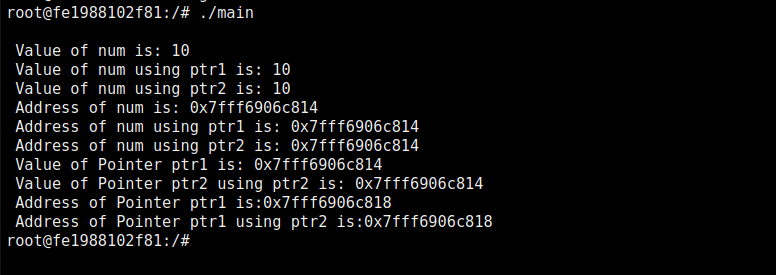Wait we haven't finished pointers yet, if you haven't seen the previous blog post i highly suggest you check it out.
So on this blog post we are going to dive deep into even more pointers.
#C – Pointer to Pointer
Pointer to pointer is a form of chained pointer in which a pointer holds the address of another pointer.
The declaration of pointer to pointer is done by adding an additional asterisk in front of its name.
A pointer with an n amount of asterisk() can hold the address of any pointer with a n - 1 asterisks().
TYPE **VAR_NAME;
In this case the pointer with a double asterisk() can hold the address of a pointer with a single asterisk() and they have the same value across.
Example
To Generalize this Example:
num == *ptr1 == **ptr2
&num == ptr1 == *ptr2
&ptr1 == ptr2
When declaration of variable the memory layout for this example is:

After assigning the value 10 to num the memory layout will look like
After adding in the address of the num to ptr1 and ptr1 to ptr2 the memory layout will look like this:
As you can see in the above tables we used numbers to represent the address of variables to better understand the concept, address are most commonly put in the like the output of the example in some form of hexadecimal.
In the table the value of num = 10 and address = 13, the ptr1 holds the address of num as a value which is 13 and the address of ptr1 is 17.
Now we come to pointer to pointer in the table ptr2 holds the address of the other pointer ptr1 as a value and this is the case of ptr2(double pointer) it holds the address of other pointer in it.
#Two dimensional (2D) arrays
A two dimensional arrays is also know as array of arrays.
To declare a two dimensional array
TYPE ARRAY_NAME[x][Y]
Where type can be any valid C data type, arrayName will be a valid C identifier, x number of rows and y number of columns.
To initializing two-dimensional arrays we use two method
int a[3][4] = {{0, 1, 2, 3},{6, 3, 61, 7},{10, 75, 1, 16}};
int a[3][4] = {0,1,2,3,6,3,61,7,10,75,1,16};
with 2D array, you must always specify the second dimension even if you are specifying elements during the declaration.
int a[][] = {1, 2, 3 ,4 }
This is invalid because the second value is not specified.
Example
The memory layout to the following example is


















Top comments (0)